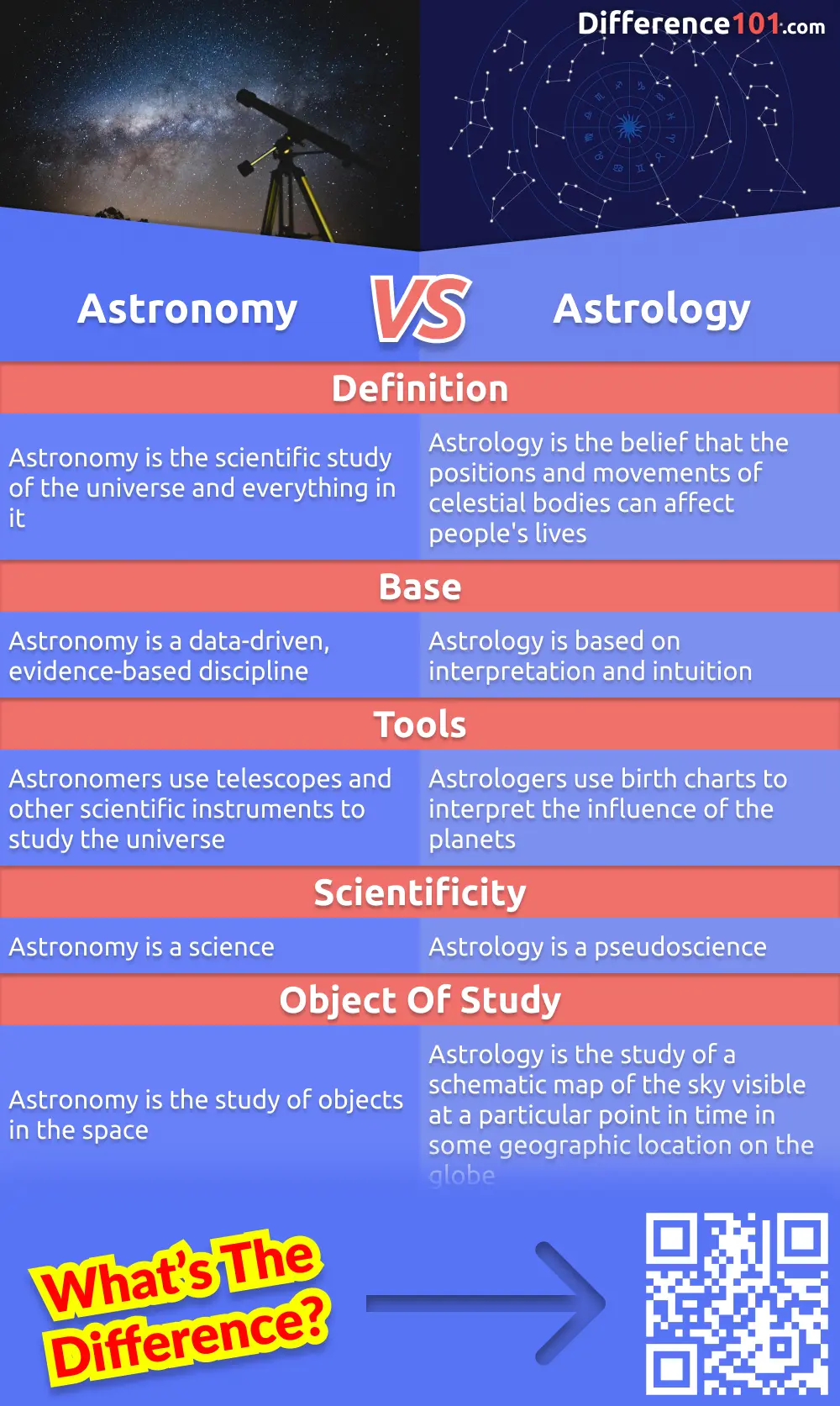You may think that astrology and astronomy are interchangeable terms, but they are actually two different fields of study. While both involve the study of celestial objects, their goals and methods differ greatly. Astronomy focuses on the scientific understanding of the universe, exploring the physical properties of planets, stars, and galaxies. On the other hand, astrology is more concerned with interpreting these celestial bodies and their influence on human behavior and events on Earth. So, let’s delve deeper into the distinctions and similarities between these fascinating disciplines.
Definition of Astrology and Astronomy
Astrology Definition
Astrology is a system of beliefs and practices that seeks to understand and interpret the influence of celestial objects and their movements on human behavior and destiny. It is often associated with horoscopes, which are commonly found in newspapers and magazines, and are based on the positions of the sun, moon, planets, and other celestial bodies at the time of a person’s birth. Advocates of astrology believe that these cosmic alignments can reflect and affect various aspects of a person’s life, including personality traits, relationships, and future events.
Astronomy Definition
On the other hand, astronomy is the scientific study of celestial objects, their properties, and the physical laws governing their behavior. It involves observing and understanding the universe beyond planet Earth, including stars, planets, galaxies, and other astronomical phenomena. Astronomers use telescopes, satellites, and other advanced technologies to collect data and analyze the nature and movements of celestial objects. Unlike astrology, which focuses on the influence of these objects on humans, astronomy is primarily concerned with the exploration and explanation of the vast expanse of the universe.
Historical Context
Origins of Astrology
Astrology has a long and complex history that dates back to ancient civilizations. Some of the earliest known astrological practices can be traced back to ancient Mesopotamia in the 3rd millennium BCE. The Mesopotamians believed that celestial events and the positions of planets could reveal insights about earthly affairs and the fate of individuals and nations. Astrology also gained prominence in ancient Egypt and played a significant role in the religious and political spheres.
Origins of Astronomy
Astronomy has its roots in ancient civilizations as well, with notable contributions from the ancient Egyptians, Greeks, and Chinese. Early astronomers were keen observers of the night sky and sought to understand the movements of celestial bodies. They used their observations to develop calendars, navigate seafaring journeys, and make predictions about natural phenomena like eclipses. Ancient astronomers like Ptolemy, Hipparchus, and Copernicus made groundbreaking discoveries and laid the foundation for the scientific study of the universe.
Relationship between Astrology and Astronomy in Early Civilizations
In the early stages of human civilization, astrology and astronomy were closely intertwined. Ancient cultures saw the sky as a reflection of the divine, and celestial events were believed to hold great significance. Astronomical observations were used to make astrological predictions and guide important decisions. However, as scientific knowledge advanced, the two disciplines gradually diverged, with astronomy evolving into a rigorous scientific field and astrology taking a more mystical and subjective path.

Differences between Astrology and Astronomy
Purpose and Goals
The purpose of astrology is primarily centered around providing insights into human behavior, relationships, and personal destiny. It seeks to answer questions about one’s personality traits, future events, and even compatibility with others. On the other hand, the primary goal of astronomy is to understand the universe and its workings. Astronomers conduct extensive research to unravel the mysteries of the cosmos, focusing on the physical properties, origins, and evolution of celestial objects.
Methods and Approaches
Astrology relies heavily on interpretations, charting, and calculations based on astrological charts and horoscopes. These charts are created by mapping the positions of celestial bodies at specific times and using astrological principles to decode their meaning. In contrast, astronomy employs the scientific method, which involves systematic observation, data analysis, and rigorous mathematical modeling. Astronomers collect empirical data through telescopes and other instruments, and their findings undergo rigorous peer review and scrutiny.
Scientific Validity
One of the key distinctions between astrology and astronomy lies in their scientific validity. While astronomy is firmly grounded in science, astrology lacks empirical evidence to support its claims. The principles and predictions of astrology are largely based on subjective interpretations and anecdotal evidence, making it difficult to establish a scientifically verifiable foundation for its assertions. In contrast, astronomy relies on the scrutiny of empirical data, mathematical models, and adherence to scientific principles.
Expertise and Training
Another significant difference between astrology and astronomy lies in the level of expertise and training required in each discipline. Becoming a professional astronomer typically involves obtaining advanced degrees in astronomy or astrophysics, along with rigorous training in scientific research methodologies. In contrast, astrology does not have standardized educational requirements or a universally recognized certification process. Astrologers may acquire their knowledge and skills through self-study, mentorship, or various astrology schools and organizations.
Astrology in Modern Society
Popularity and Belief in Astrology
Astrology continues to have a significant presence and following in modern society. Many people consult horoscopes and astrological readings for entertainment or personal guidance. There are numerous astrology apps, websites, and social media accounts that provide daily horoscopes and personalized readings. Despite scientific skepticism, astrology’s popularity persists, with some individuals strongly believing in its ability to provide insights into their lives and relationships.
Use in Personal and Psychological Development
Astrology is also utilized by some individuals as a tool for personal and psychological development. Some proponents believe that analyzing astrological charts can provide valuable insights into one’s strengths, weaknesses, and potential areas of growth. By understanding the planetary influences at play, individuals may gain a deeper understanding of their patterns, motivations, and emotional tendencies. This self-awareness can be used as a catalyst for personal growth, fostering a sense of empowerment and self-reflection.
Criticism and Skepticism
Despite its popularity, astrology has been subject to criticism and skepticism from the scientific community. Skeptics argue that astrological predictions and readings are vague and ambiguous, allowing individuals to project meaning onto them. They contend that the apparent accuracy of astrological readings can often be attributed to general statements that can apply to many individuals. Furthermore, astrological claims often lack theoretical frameworks or empirical evidence to support their validity, further fueling the skepticism surrounding the practice.
Astronomy in Modern Society
Scientific Contributions and Discoveries
Astronomy continues to make significant contributions to our understanding of the universe and has fueled numerous scientific discoveries. From unraveling the mysteries of black holes to understanding the origins of the universe through the study of cosmic microwave background radiation, astronomers have expanded our knowledge and challenged our perceptions of the cosmos. Their research has enabled breakthroughs in cosmology, astrophysics, and other scientific disciplines, ultimately advancing our understanding of the universe we inhabit.
Technological Advancements
The pursuit of astronomical research has driven the development of advanced technologies that have far-reaching applications beyond the field itself. The invention and improvement of telescopes, satellites, and space probes have revolutionized the way we observe and study the universe. Innovations such as adaptive optics, radio telescopes, and space-based observatories have provided astronomers with unprecedented capabilities to explore the cosmos and collect vast amounts of data. These technological advancements have also found applications in other areas, such as atmospheric science and telecommunications.
Education and Research
Astronomy plays a crucial role in education and research, inspiring future scientists and contributing to the broader scientific community. Educational institutions offer astronomy courses and programs, fostering curiosity and a deeper understanding of the universe among students. Research conducted by astronomers contributes to our understanding of the universe’s composition, evolution, and history. Collaborations between astronomers worldwide further enrich the field through the exchange of knowledge and the tackling of complex research questions.
Relationship and Interactions
Intersection in Celestial Observation
Astrology and astronomy share a common foundation in the observation of celestial bodies. Both disciplines involve studying the positions, movements, and interactions of celestial objects, albeit with different goals and interpretations. Astrologers and astronomers look to the sky to gather data that informs their respective practices and interpretations. However, their approaches diverge when it comes to assigning meaning and significance to these observations.
Astrological References in Astronomy
In the realm of astronomy, astrological references are often used informally or metaphorically. For example, the zodiac signs and constellations derived from astrology play a role in identifying and naming specific regions of the night sky. These celestial objects serve as points of reference for astronomers, aiding in their navigation and identification of stars, galaxies, and other astronomical phenomena. However, it is important to note that these references are used purely for convenience and do not imply any endorsement or validation of astrological principles.
Collaboration and Mutual Exclusions
While astronomy and astrology share some common ground in their exploration of the night sky, they also exist as distinct and separate fields. The scientific rigor and empirical approach of astronomy contrast sharply with the subjective interpretations and mystical nature of astrology. This fundamental disparity has led to a clear separation between the two disciplines, with astronomers generally dismissing astrology as a pseudoscience. However, it is worth noting that some individuals may have overlapping interests in both areas, appreciating them for their respective contributions to human understanding.
Misconceptions and Confusion
Common Misunderstandings
One common misconception is that astrology and astronomy are interchangeable terms describing the same activity. This confusion often arises from the historical association between the two disciplines, which has blurred over time. However, as outlined in this article, astrology and astronomy differ significantly in their goals, methods, and scientific validity. Another misconception is that astrology’s predictions and readings are consistently accurate. In reality, astrology’s predictions are often generalized and open to interpretation, diminishing their reliability and objective accuracy.
Misrepresentation in Media
Astrology and astronomy are occasionally misrepresented or conflated in popular media, contributing to the confusion surrounding the two. Some fictional works, films, and television shows may inaccurately depict astrology as a scientifically grounded practice or merge it with astronomical concepts. While such portrayals can add to the entertainment value, they can also perpetuate misconceptions about the nature and credibility of astrology and misunderstandings about the scientific rigor of astronomy.
Public Perception
The public perception of astrology and astronomy can vary widely. While many people recognize the scientific merits of astronomy, astrology enjoys a significant following and interest from individuals seeking guidance or entertainment. The belief in astrology can be deeply personal and subjective, originating from cultural, religious, or personal beliefs. It is crucial to respect individual perspectives while critically evaluating the scientific foundation and validity of the claims made by astrology.
Conclusion
Astrology and astronomy, though historically connected, have diverged over time to become distinct disciplines with differing goals and methodologies. While astrology focuses on the influence of celestial bodies on human behavior and destiny, astronomy explores the universe’s physical properties and evolution. While astrology continues to hold cultural significance and engage many individuals on a personal level, astronomy contributes to scientific knowledge and technological advancements. Understanding the differences between the two can help foster critical thinking and promote a deeper appreciation for the achievements and limitations of each field.
